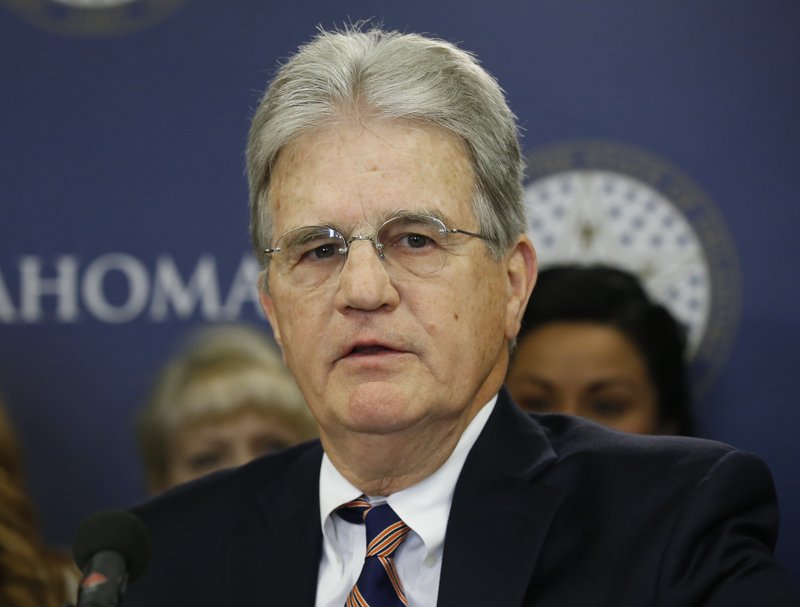Former U.S. Sen. Tom Coburn was stubborn as a mule and conservative to his core. But the Oklahoma family doctor, known for railing against federal earmarks, didn’t let political differences dictate whom he called friends — even if it didn’t sit well with some of his supporters.
Coburn, who died early Saturday at age 72, joined the U.S. Senate the same year as President Barack Obama, and the pair became fast friends despite their contrasting ideologies. In Oklahoma, where Obama failed to carry a single county in his 2008 presidential bid, voters took note.
But the Republican senator shrugged off complaints in 2009, when the state’s largest newspaper, The Oklahoman, ran a front-page photograph that showed him hugging Obama after the Democratic president gave a speech to a joint session of Congress.
ADVERTISEMENT
“I’m not aligned with him politically. I don’t know what people back home in Oklahoma would be worried about,” Coburn, who was re-elected the following year, said at the time. “But you need to separate the difference in political philosophy versus friendship. How better to influence somebody than love them?”
Coburn’s death was confirmed to The Associated Press by cousin Bob Coburn. He did not provide a cause of death, but Tom Coburn had been undergoing treatment for prostate cancer for years.
Coburn earned a reputation as a conservative political maverick in Congress. He also delivered more than 4,000 babies while an obstetrician and family doctor in Muskogee, where he treated patients for free while in the Senate.
Oklahoma Republican Sen. James Lankford called Coburn “an inspiration to many.”
“He was unwavering in his conservative values, but he had deep and meaningful friendships with people from all political and personal backgrounds,” Lankford said in a statement.
Known for bluntly speaking his mind, Coburn frequently criticized the growth of the federal deficit and what he said was excessive government spending endorsed by politicians from both political parties.
“I’ve got a flat forehead from beating my head against the wall,” he told voters in July 2010.
First elected to the U.S. House during the so-called Republican Revolution in 1994, Coburn fiercely criticized the use of federal money for special state projects and was among the few members of Congress who refused to seek such earmarks for their home states.
He represented northeastern Oklahoma for three terms, keeping a pledge in 2000 not to seek re-election. He returned to his medical practice in Muskogee before asking voters to send him back to Washington in 2004, this time to the Senate, so he could fight big spenders and ensure “that our children and grandchildren have a future.”
Coburn was re-elected in 2010, but left his second term early, in January 2015, after he was diagnosed with a recurrence of prostate cancer. He said he was convinced he could “best serve my own children and grandchildren by shifting my focus elsewhere.”
In the Senate, Coburn released a series of oversight reports detailing what he described as wasteful government spending. A 37-page report in 2011, dubbed “Subsidies of the Rich and Famous,” detailed nearly $30 billion spent annually in government subsidies, tax breaks and federal grant programs to millionaires.
“From tax write-offs for gambling losses, vacation homes, and luxury yachts to subsidies for their ranches and estates, the government is subsidizing the lifestyles of the rich and famous,” Coburn wrote in the report.
A joint report issued in August 2010 by Coburn and Arizona Sen. John McCain, who died in 2018, criticized stimulus spending, including $1.9 million for international ant research and $39.7 million to upgrade the Statehouse and political offices in Topeka, Kansas.
Coburn’s stubbornness and thwarting of legislation considered worthy by Democrats frustrated then-Senate Majority Leader Harry Reid.
“You cannot negotiate with Coburn,” Reid, a Democrat, declared in 2008. “It’s just something you learn over the years is a waste of time.”
During debate over the debt ceiling in the summer of 2011, Coburn was part of a bipartisan “Gang of Six” senators who supported an alternative plan to cut the deficit by almost $4 trillion over the next decade through budget cuts and increased revenue through changes to the tax code.
After leaving the Senate, Coburn continued to crusade against taxes, criticizing the Oklahoma Legislature when it passed increases in 2018 to shore up the state budget. A group led by Coburn attempted to launch a petition drive to overturn the tax hikes, but was ultimately unsuccessful.
Born in Casper, Wyoming, on March 14, 1948, Coburn grew up in Muskogee, Oklahoma. After graduating from Oklahoma State University, he went to work at his family’s business in Virginia, Ophthalmic Division of Coburn Opticals, from 1970 to 1978. He later attended medical school at the University of Oklahoma.
By the time he jumped into politics — a decision he said was based on runaway government spending and his distaste for career politicians — he was married to his wife, Carolyn, with three children and had established a successful medical practice.
Coburn had several health scares during his time in office. He was treated for malignant melanoma in 1975, and in 2011, he underwent surgery for prostate cancer.
Health woes didn’t seem to damper his contentious attitude.
After revealing in 2003 that he had been diagnosed with colon cancer and underwent surgery and chemotherapy, he told a Tulsa World reporter: “You should be writing about Medicaid and Medicare instead of my health.”
(AP)











